Letters relating to Benjamin Bennett Leane, 1914-1927
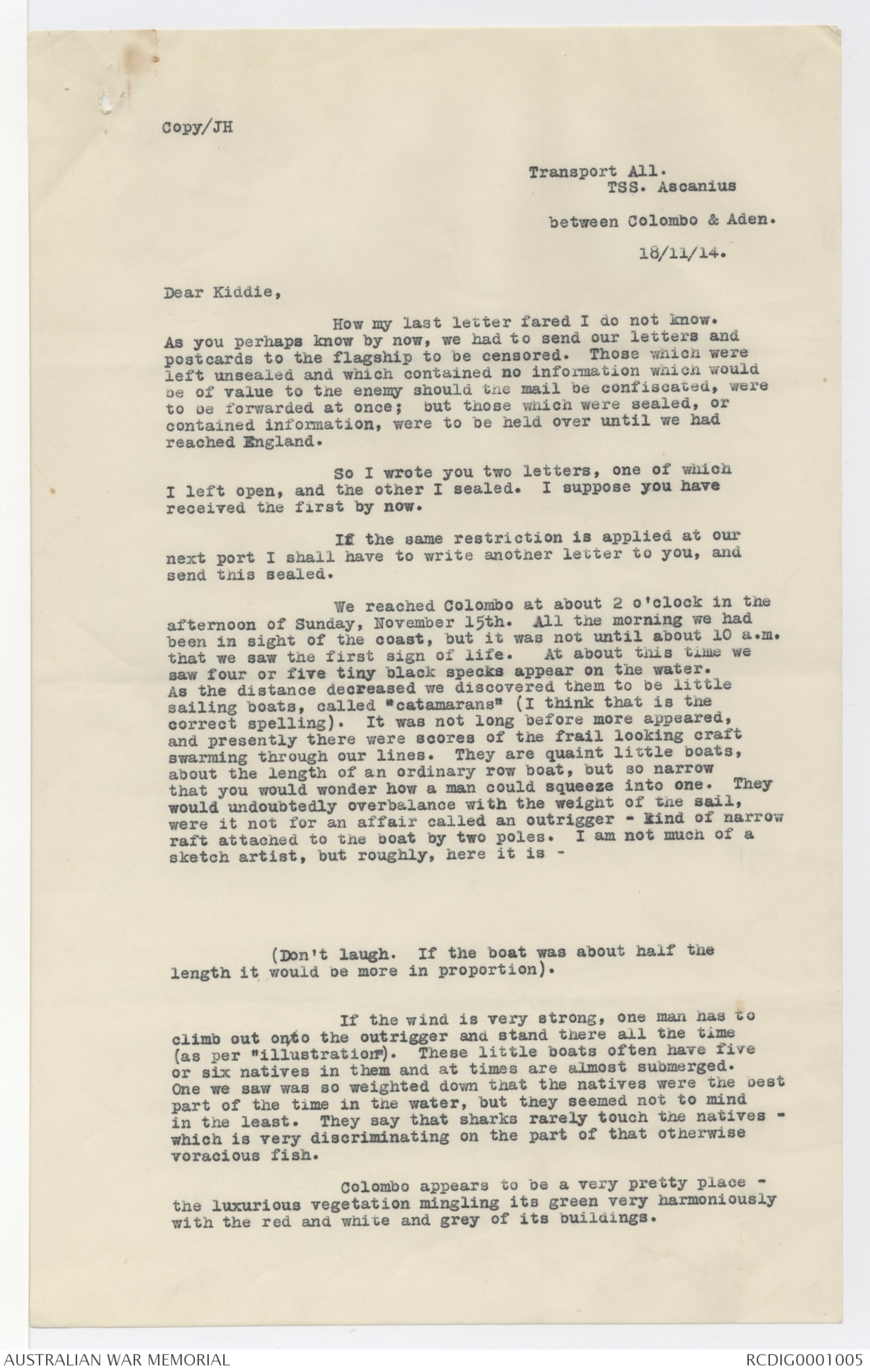
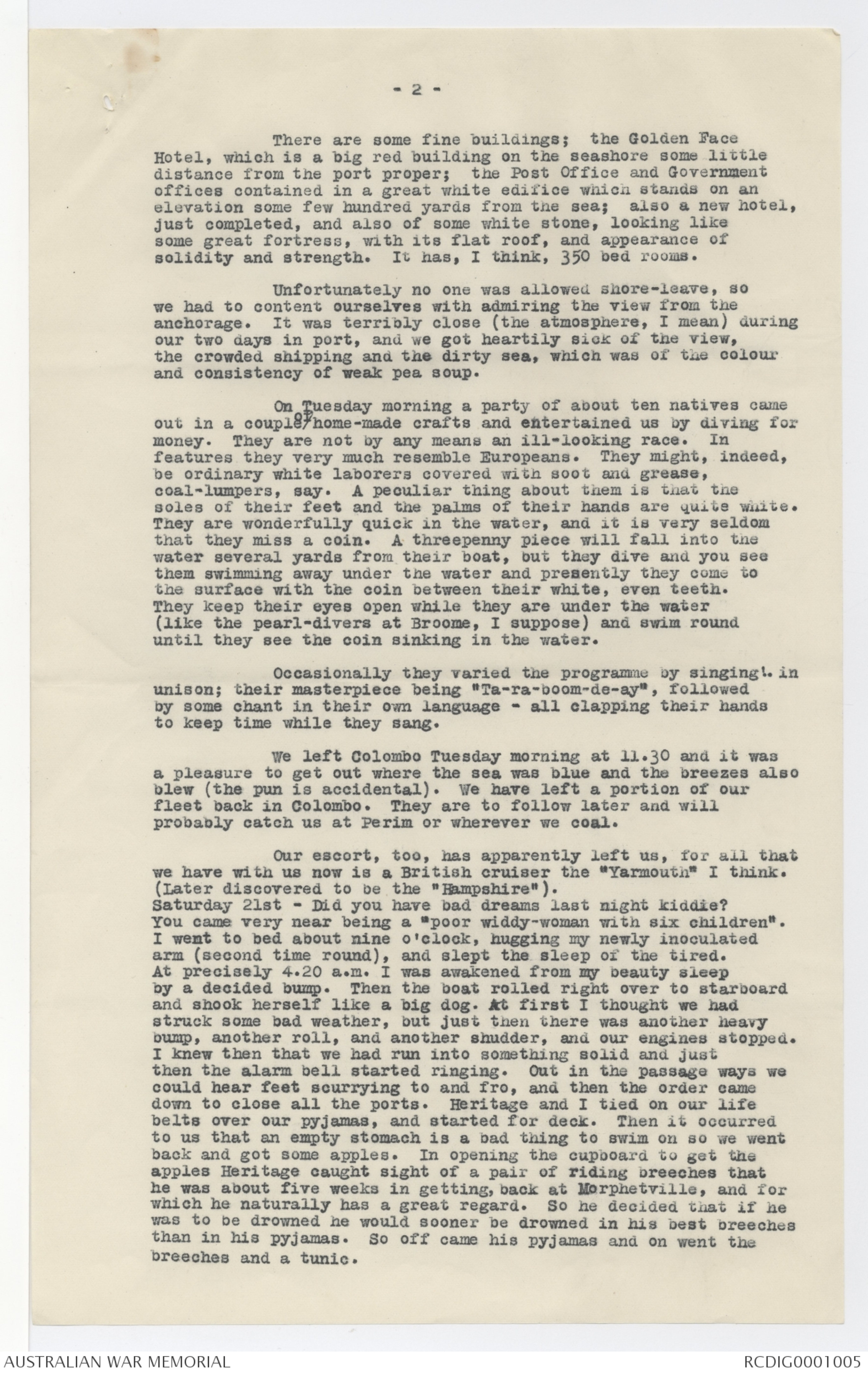
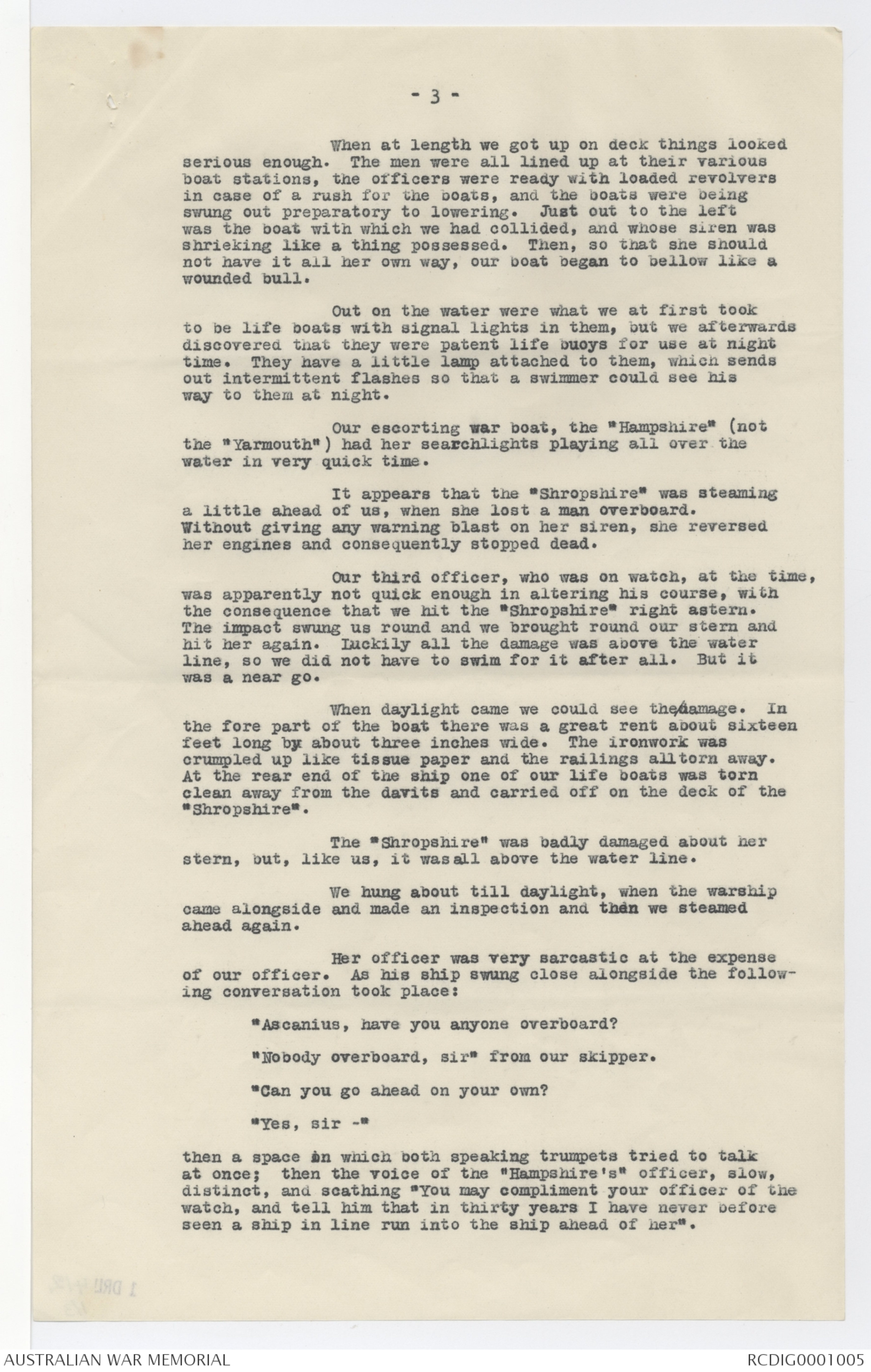
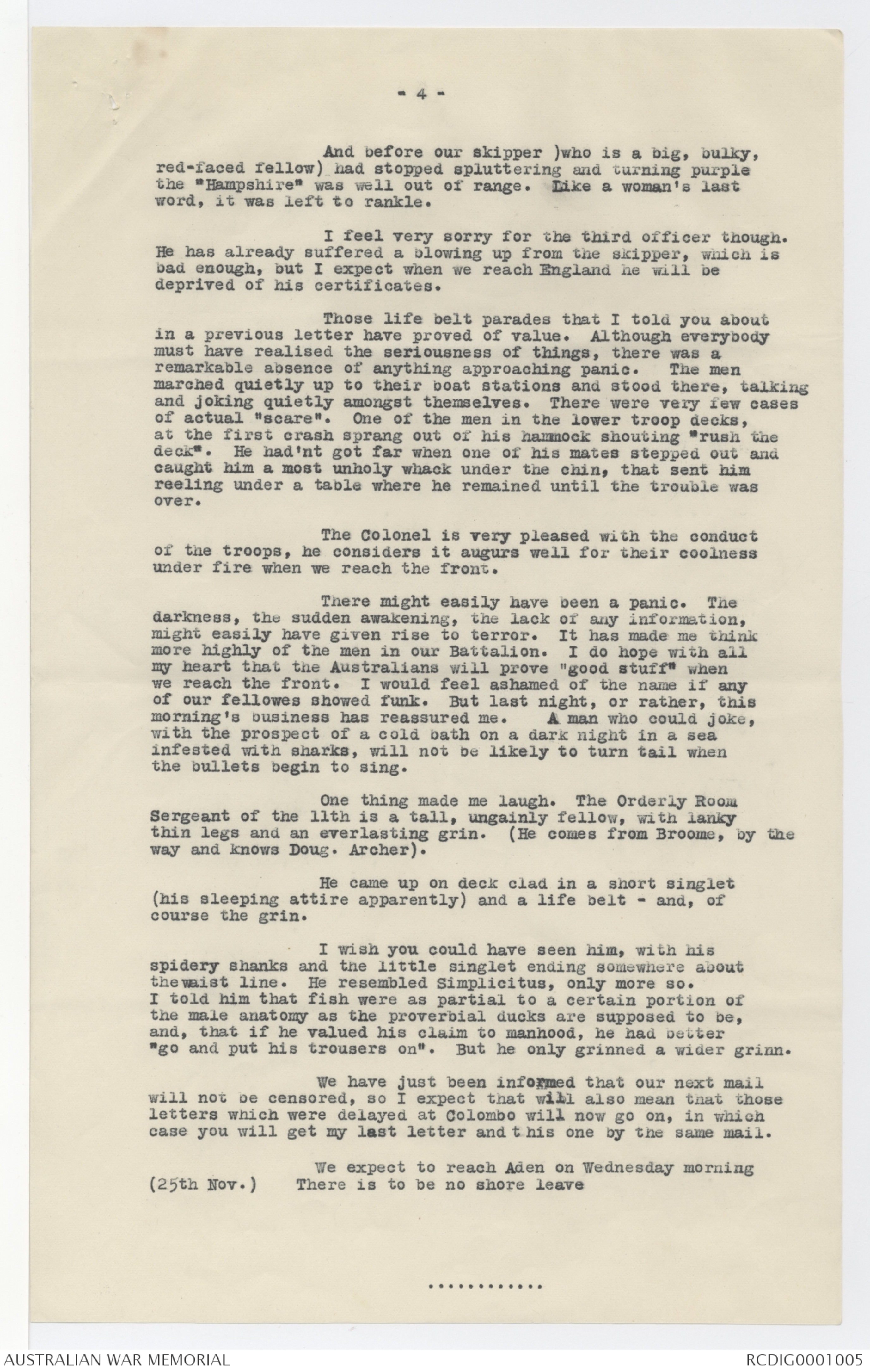
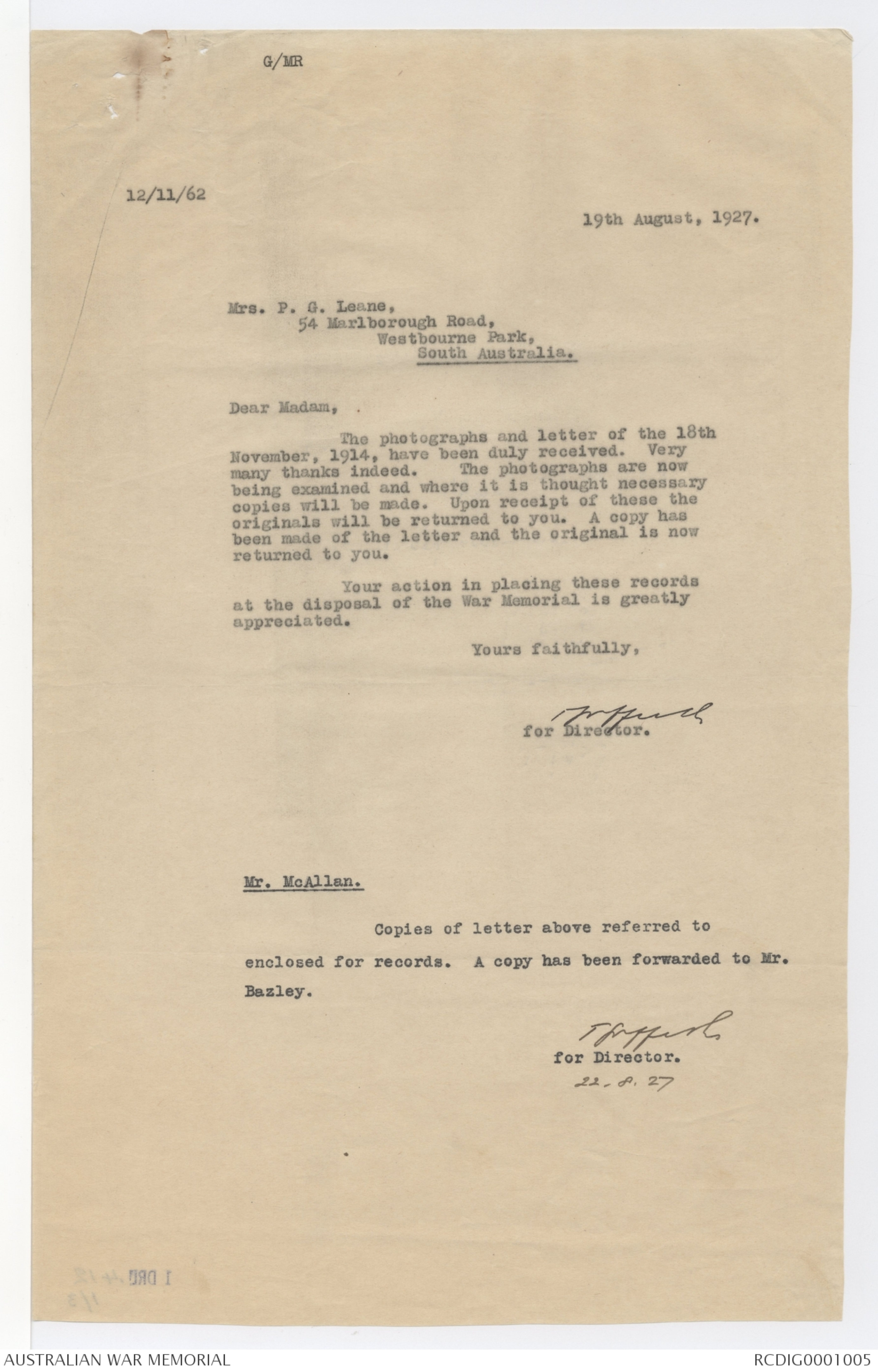
Copy/JH
Transport All.
TSS. Ascanius
between Colombo & Aden.
18/11/14.
Dear Kiddie,
How my last letter fared I do not know.
As you perhaps know by now, we had to send our letters and
postcards to the flagship to be censored. Those which were
left unsealed and which contained no information which would
be of value to the enemy should the mail be confiscated, were
to be forwarded at once; but those which were sealed, or
contained information, were to be held over until we had
reached England.
So I wrote you two letters, one of which
I left open, and the other I sealed. I suppose you have
received the first by now.
If the same restriction is applied at our
next port I shall have to write another letter to you, and
send this sealed.
We reached Colombo at about 2 o'clock in the
afternoon of Sunday, November 15th. All the morning we had
been in sight of the coast, but it was not until about 10 a.m.
that we saw the first sign of life. At about this time we
saw four or five tiny black specks appear on the water.
As the distance decreased we discovered them to be little
sailing boats, called "catamarans" (I think that is the
correct spelling). It was not long before more appeared,
and presently there were scores of the frail looking craft
swarming through our lines. They are quaint little boats,
about the length of an ordinary row boat, but so narrow
that you would wonder how a man could squeeze into one. They
would undoubtedly overbalance with the weight of the sail,
were it not for an affair called an outrigger - kind of narrow
raft attached to the boat by two poles. I am not much of a
sketch artist, but roughly, here it is -
(Don't laugh. If the boat was about half the
length it would be more in proportion).
If the wind is very strong, one man has to
climb out on/to the outrigger and stand there all the time
(as per "illustration"). These little boats often have five
or six natives in them and at times are almost submerged.
One we saw was so weighted down that the natives were the best
part of the time in the water, but they seemed not to mind
in the least. They say that sharks rarely touch the natives -
which is very discriminating on the part of that otherwise
voracious fish.
Colombo appears to be a very pretty place -
the luxurious vegetation mingling its green very harmoniously
with the red and white and grey of its buildings.
-2-
There are some fine buildings; the Golden Face
Hotel, which is a big red building on the seashore some little
distance from the port proper; the Post Office and Government
offices contained in a great white edifice which stands on an
elevation some few hundred yards from the sea; also a new hotel,
just completed, and also of some white stone, looking like
some great fortress, with its flat roof, and appearance of
solidity and strength. It has, I think, 350 bed rooms.
Unfortunately no one was allowed shore-leave, so
we had to content ourselves with admiring the view from the
anchorage. It was terribly close (the atmosphere, I mean) during
our two days in port, and we got heartily sick of the view,
the crowded shipping and the dirty sea, which was of the colour
and consistency of weak pea soup.
On Tuesday morning a party of about ten natives came
out in a couple of home-made crafts and entertained us by diving for
money. They are not by any means an ill-looking race. In
features they very much resemble Europeans. They might, indeed,
be ordinary white laborers covered with soot and grease,
coal-lumpers, say. A peculiar thing about them is that the
soles of their feet and the palms of their hands are quite white.
They are wonderfully quick in the water, and it is very seldom
that they miss a coin. A threepenny piece will fall into the
water several yards from their boat, but they dive and you see
them swimming away under the water and presently they come to
the surface with the coin between their white, even teeth.
They keep their eyes open while they are under the water
(like the pearl-divers at Broome, I suppose) and swim round
until they see the coin sinking in the water.
Occasionally they varied the programme by singing! in
unison; their masterpiece being "Ta-ra-boom-de-ay", followed
by some chant in their own language - all clapping their hands
to keep time while they sang.
We left Colombo Tuesday morning at 11.30 and it was
a pleasure to get out where the sea was blue and the breezes also
blew (the pun is accidental). We have left a portion of our
fleet back in Colombo. They are to follow later and will
probably catch us at Perim or wherever we coal.
Our escort, too, has apparently left us, for all that
we have with us now is a British cruiser the "Yarmouth" I think.
(Later discovered to be the "Hampshire").
Saturday 21st - Did you have bad dreams last night kiddie?
You came very near being a "poor widdy-woman with six children".
I went to bed about nine o'clock, hugging my newly inoculated
arm (second time round), and slept the sleep of the tired.
At precisely 4.20 a.m. I was awakened from my beauty sleep
by a decided bump. Then the boat rolled right over to starboard
and shook herself like a big dog. At first I thought we had
struck some bad weather, but just then there was another heavy
bump, another roll, and another shudder, and our engines stopped.
I knew then that we had run into something solid and just
then the alarm bell started ringing. Out in the passage ways we
could hear feet scurrying to and fro, and then the order came
down to close all the ports. Heritage and I tied on our life
belts over our pyjamas, and started for deck. Then it occurred
to us that an empty stomach is a bad thing to swim on so we went
back and got some apples. In opening the cupboard to get the
apples Heritage caught sight of a pair of riding breeches that
he was about five weeks in getting, back at Morphetville, and for
which he naturally has a great regard. So he decided that if he
was to be drowned he would sooner be drowned in his best breeches
than in his pyjamas. So off came his pyjamas and on went the
breeches and a tunic.
-3-
When at length we got up on deck things looked
serious enough. The men were all lined up at their various
boat stations, the officers were ready with loaded revolvers
in case of a rush for the boats, and the boats were being
swung out preparatory to lowering. Just out to the left
was the boat with which we had collided, and whose siren was
shrieking like a thing possessed. Then, so that she should
not have it all her own way, our boat began to bellow like a
wounded bull.
Out on the water were what we at first took
to be life boats with signal lights in them, but we afterwards
discovered that they were patent life buoys for use at night
time. They have a little lamp attached to them, which sends
out intermittent flashes so that a swimmer could see his
way to them at night.
Our escorting war boat, the "Hampshire" (not
the "Yarmouth") had her searchlights playing all over the
water in very quick time.
It appears that the "Shropshire" was steaming
a little ahead of us, when she lost a man overboard.
Without giving any warning blast on her siren, she reversed
her engines and consequently stopped dead.
Our third officer, who was on watch, at the time,
was apparently not quick enough in altering his course, with
the consequence that we hit the "Shropshire" right astern.
The impact swung us round and we brought round our stern and
hit her again. Luckily all the damage was above the water
line, so we did not have to swim for it after all. But it
was a near go.
When daylight came we could see the/damage. In
the fore part of the boat there was a great rent about sixteen
feet long by about three inches wide. The ironwork was
crumpled up like tissue paper and the railings alltorn away.
At the rear end of the ship one of our life boats was torn
clean away from the davits and carried off on the deck of the
"Shropshire".
The "Shropshire" was badly damaged about her
stern, but, like us, it was all above the water line.
We hung about till daylight, when the warship
came alongside and made an inspection and then we steamed
ahead again.
Her officer was very sarcastic at the expense
of our officer. As his ship swung close alongside the following
conversation took place:
"Ascanius, have you anyone overboard?
"Nobody overboard, sir" from our skipper.
"Can you go ahead on your own?
"Yes, sir -"
then a space in which both speaking trumpets tried to talk
at once; then the voice of the "Hampshire's" officer, slow,
distinct, and scathing "You may compliment your officer of the
watch, and tell him that in thirty years I have never before
seen a ship in line run into the ship ahead of her".
- 4 -
And before our skipper ) who is a big, bulky,
red-faced fellow) had stopped spluttering and turning purple
the "Hampshire" was well out of range. Like a woman's last
word, it was left to rankle.
I feel very sorry for the third officer though.
He has already suffered a blowing up from the skipper, which is
bad enough, but I expect when we reach England he will be
deprived of his certificates.
Those life belt parades that I told you about
in a previous letter have proved of value. Although everybody
must have realised the seriousness of things, there was a
remarkable absence of anything approaching panic. The men
marched quietly up to their boat stations and stood there, talking
and joking quietly amongst themselves. There were very few cases
of actual "scare". One of the men in the lower troop decks,
at the first crash sprang out of his hammock shouting "rush the
deck". He had'nt got far when one of his mates stepped out and
caught him a most unholy whack under the chin, that sent him
reeling under a table where he remained until the trouble was
over.
The Colonel is very pleased with the conduct
of the troops, he considers it augurs well for their coolness
under fire when we reach the front.
There might easily have been a panic. The
darkness, the sudden awakening, the lack of any information,
might easily have given rise to terror. It has made me think
more highly of the men in our Battalion. I do hope with all
my heart that the Australians will prove "good stuff" when
we reach the front. I would feel ashamed of the name if any
of our fellowes showed funk. But last night, or rather, this
morning's business has reassured me. A man who could joke,
with the prospect of a cold bath on a dark night in a sea
infested with sharks, will not be likely to turn tail when
the bullets begin to sing.
One thing made me laugh. The Orderly Room
Sergeant of the 11th is a tall, ungainly fellow, with lanky
thin legs and an everlasting grin. (He comes from Broome, by the
way and knows Doug. Archer).
He came up on deck clad in a short singlet
(his sleeping attire apparently) and a life belt - and, of
course the grin.
I wish you could have seen him, with his
spidery shanks and the little singlet ending somewhere about
the waist line.
He resembled Simplicitus, only more so.
I told him that fish were as partial to a certain portion of
the male anatomy as the proverbial ducks are supposed to be,
and, that if he valued his claim to manhood, he had better
"go and put his trousers on". But he only grinned a wider grinn.
We have just been informed that our next mail
will not be censored, so I expect that will also mean that those
letters which were delayed at Colombo will now go on, in which
case you will get my last letter and this one by the same mail.
We expect to reach Aden on Wednesday morning
(25th Nov.) There is to be no shore leave
.
G/MR
12/11/62
19th August, 1927.
Mrs. P. G. Leane,
54 Marlborough Road,
Westbourne Park,
South Australia.
Dear Madam,
The photographs and letter of the 18th
November, 1914, have been duly received. Very
many thanks indeed. The photographs are now
being examined and where it is thought necessary
copies will be made. Upon receipt of these the
originals will be returned to you. A copy has
been made of the letter and the original is now
returned to you.
Your action in placing these records
at the disposal of the War Memorial is greatly
appreciated.
Yours faithfully,
T Griffiths
for Director.
Mr. McAllan.
Copies of letter above referred to
enclosed for records. A copy has been forwarded to Mr.
Bazley.
T Griffiths
for Director.
22. 8. 27
 Loretta Corbett
Loretta CorbettThis transcription item is now locked to you for editing. To release the lock either Save your changes or Cancel.
This lock will be automatically released after 60 minutes of inactivity.